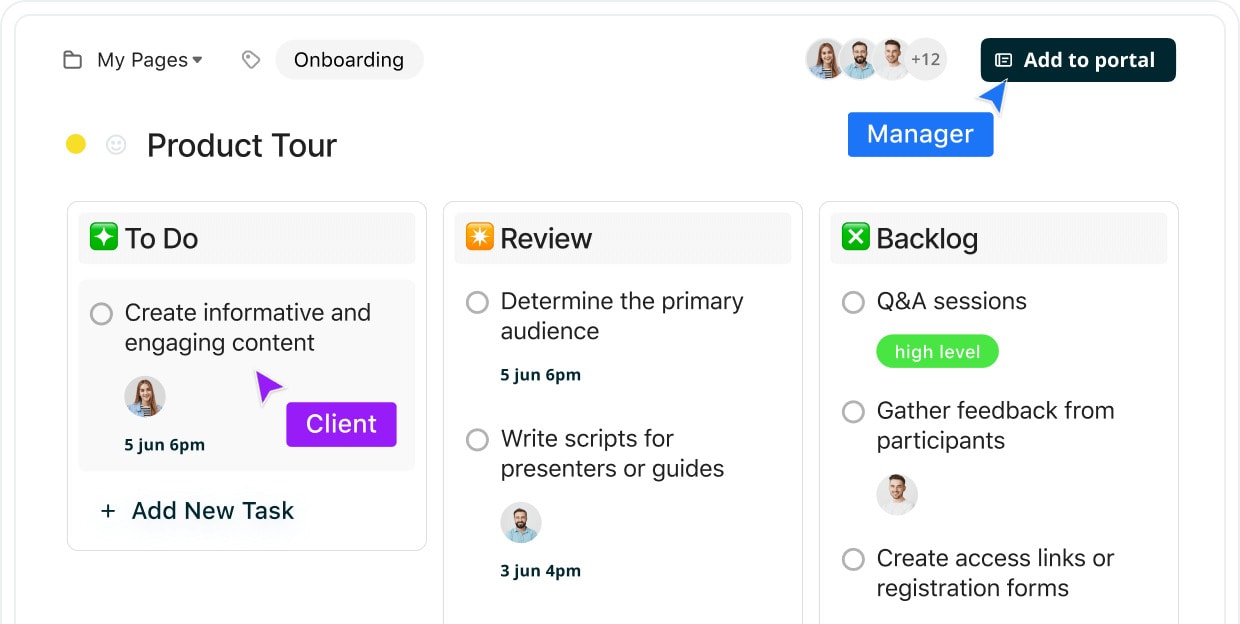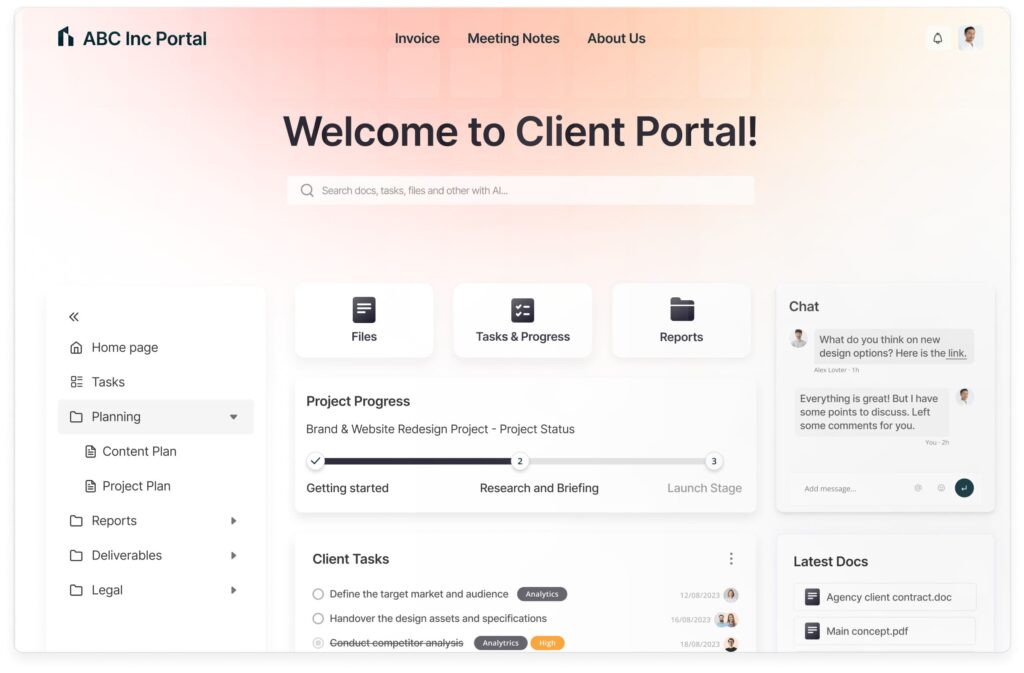
Top 9 Aligned Alternatives and Deal Room Software Competitors
- 11 Min read
You may have developed the most fantastic product or devised the most incredible service, but whether you will give the world a chance to benefit from your brainchild and thus make a profit, hugely depends on your ability to sell it. That said, selling alone is not the only key to your business success. Your sales team may be capable of selling snow to the Inuit, but selling snow once will not boost your business. Today’s highly competitive market requires personalization and premium customer experience. This is where your revenue mostly comes from. A study from Smallbizgenius claims that almost 65% of a company’s business comes from existing customers. Forbes adds that 71% of consumers feel frustrated when a shopping experience is impersonal, and this is a reason they avoid buying. On the contrary, 91% of consumers are more likely to shop with brands that provide offers, today’s deals, recommendations and verified reviews that are relevant to them. What do you, as a startup, have to do with these statistics? You have to introduce such tools and processes into your business that will, firstly, personalize your offer to attract new customers and give them proper reason to buy from you, and secondly, allow you to retain your existing customers through well-tailored communication. The best tool that helps with such solutions is a CRM system.
Ever since Siebel Systems released its Siebel Sales Enterprise, reportedly the first CRM solution, in 1995, the CRM sector has been growing with each passing year. Statista shows that the worldwide CRM software revenue grew from 13 billion US dollars in 2010 to 69 billion in 2020, and keeps growing. So what is this CRM tool that apparently is so indispensable today?
CRM stands for customer relationship management. It means both the methodology of a global approach to your company’s relationship with customers and the management tool that helps to implement this methodology in practice. A CRM system is a piece of software working as a hub that automates all your customer interactions and business processes.
Imagine a regular business. Its salesforce typically uses spreadsheets to collect and sort information about customers and leads; phone calls, live chats and emails for customer communication; calendars for scheduling those calls and meetings; contact management, customer ratings and reviews and what not. Add the marketing team that develops, launches and analyzes marketing campaigns, creates presence in the social media and generates leads for the sales. Plus the financial department that needs to forecast and assess the revenue and budgets, as well as keep track of invoices. The number of tools these departments need may arise to a dozen. A proper CRM tool kills two (or rather that dozen) birds with one stone. A CRM is there to provide a place that accumulates all this information for different departments, to automate numerous business processes and to streamline all aspects of customer communication.
When you are just starting your business – alone or with a small team of like-minded enthusiasts – you keep in mind hundreds of details. You post a sticker on your monitor to remind yourself to call a potential customer and update the specification prices. You start a database with dates of birth of your first loyal clients to send them greetings and offers with discounts. You jot down a quick note outlining the preferences of another visitowhr. Depending on your business, those may be the color of the bathroom curtain, a type of shoe or a particular coffee flavor. You write some additional details too – their pet breed, their child’s age, the sport equipment they asked about. You are sure you entered it somewhere, but where? You get frustrated and, to avoid the hassle, trust it to your growing sales team. Only to find out that they didn’t show up at a scheduled meeting with a customer, mixed up names in an emailed newsletter and sent text messages to someone instead of calling them. Not because they are careless workers, but because they relied on multiple tools and contradicting bits of information, which made them confused in the end, just as you were.
So if you are working with customers (as any business does) and trying to build a rapport with them, generating financial documents, hiring new sales people, extending your product or service range, launching marketing campaigns and creating a social media presence, you need a CRM tool. More widely, if you intend to turn your startup into a working business and secretly – or openly – hope to grow into an up-and-coming unicorn, you need a CRM tool right from the start. Do not wait until you are snowed under – choose a CRM solution that will keep your startup’s interactions clear and relevant.
How do you picture an average startuper? This is typically a visionary obsessed with an idea to make a difference, and details like ROI and KPIs might get forgotten under larger goals. However, these practicalities do define the success – or failure – of a startup. That is why a systemized approach is key from the very beginning, and the CRM solution should take care of just that.
Roles in a startup are often mixed-up and only vaguely defined. The same person may be responsible for sales and billing, reporting and analyzing, creativity and event-planning. A CRM tool may help to define roles, assign tasks, monitor their accomplishment, and plan future steps.

When everyone is responsible for everything, nothing gets done. Once roles in a startup become clear, different workers should start collaborating without interfering. When all real-time information about customers is centralized in an agile CRM, categorized and readily available to everyone, with clear assignments and deadlines, collaboration between departments and within teams of the startup becomes friendly and productive.
When each employee of your startup has access to all information they need about customers and tasks, they can operate with greater autonomy, without relying on others for information. With a CRM in a mobile version, work can get done anywhere, anytime.
When your CRM solution provides each employee of your startup with the necessary information, all gathered in one hub, they do not have to flip between apps or distract each other with requests for information. This means saving time – and a lot of nerve cells.
Saving time on routine tasks, like sending emails or scheduling meetings, means it can be used more wisely, thus increasing efficiency and allowing more work to be done within the same hours. Agile CRM tools help to track deals and refine each stage of the sales pipeline. Redundant steps are removed, your staff’s learning curve renders mistakes less frequent, customer behavior patterns – more visible. Thanks to a CRM, communication improves and results in higher customer retention rate, which means your startup gets higher conversion rate and more profit.
A CRM solution looks like a silver bullet that promises better productivity, friendlier collaboration, greater staff autonomy and higher profits. When implemented correctly, it keeps the promise and improves operations of any business. But what about startups? Would it be right to say that a startup needs a CRM system more than other market players?
Let’s think what characterizes startups. One neat definition says “A startup is a company working to solve a problem where the solution is not obvious and success is not guaranteed.” Startups are characterized by innovation, rapid growth, high risk factor, flexibility, scalability and a relatively small team.
Each of these characteristics may pose a risk, and each of these risks can be avoided by your startup with a smart application of a CRM tool. Here are just a few:
To add a few more: too much data to handle, too few hands to do it, too little time in a day, mistakes that we should learn from but don’t – all these are successfully solved with a proper CRM tool. An effective tool will collect, store, update and analyze data about your customers, automate routine tasks and scheduling and provide statistics and analysis of past moves. A CRM ensures your victories and safeguards your startup from repeating blunders.
Once your startup starts rolling, your customer database consequently expands and your salesforce follows. You might find yourself in need of a tool to handle the growth. When choosing a particular CRM tool, you have to remember how special you, as a startup, are. What are your limitations and strengths? On the one hand, a startup is typically a very flexible and adaptive organism. On the other hand, a startup is often short of funding and dependent on investment. These are the challenges you need to tackle in all your activities, especially those which involve change and money spending. As a startup considering implementation of a CRM, you may want to answer these questions:
If your customer base is only being born, you might think there’s no need for a CRM, let alone the budget you need for it. However, if you do not treat your early customers right or offer them the superb customer experience they expect, they may leave your startup for competition. Besides, analyzing existing customers’ behavior and buying patterns helps attract new leads and win customers. These are exactly the issues that CRM tools help resolve, so it is never too early for a CRM.
Let’s be honest, a good tool cannot be absolutely free. There are free CRM solutions, but their functionality is limited. You can try them out and see how your startup’s life becomes easier with a CRM tool, but with the growth of your sales team you will need to switch to a paid version. Studies repeatedly demonstrate a positive impact of CRM usage on customer retention rate and lead conversion rate, so it will pay back very soon, often in a matter of months.
Processes in a startup are developing at lightning speed. The market landscape is constantly changing. This poses enough stress and strain on your team, why burden them with yet another tool to study? Well, we’re here to tell you a new tool might be worth it. Like any software, a CRM solution does need some training, but since most vendors realize 65% of users indicate the most crucial CRM feature they look for is ease of use, today’s CRM systems are both comprehensive and comprehensible.
Since a startup is usually a growing and very malleable business involving high risks, the CRM chosen should accommodate for that. Make sure the CRM solution you are going for offers the following:
A startup founder team often has unrealistically high expectations. A CRM tool will help to look at things objectively. Accurate sales forecasting, with estimates of deal value and percentage of closed deals, is important for targeting different customer segments. With CRM’s easy reporting, your startup will be provided updated statistics on the origin of leads, customer motivation, number of current deals and potential leads, the most successful ways of attracting leads, the conversion rate, and so on.
Remember that your new CRM system should take routine tasks off your shoulders rather than add to your plate. Anything that can be automated should be automated, for example:
Removing a necessity to enter data manually, a CRM allows you to stop wasting time on monkey jobs and focus on what’s most important.
You have to be careful not to fall for impressive functionality, forgetting about your real needs. Many offered CRM features can be totally redundant for your startup. What you must ensure though is the possibility to customize the following elements: stages of sales pipeline and your sales funnels, types of activity and data to be stored, metrics and templates.
Other CRM features that are key should include business data security, intuitively clear onboarding of new users, ease of scaling up, relevance of the tools to your market, system of updates and integration capacities.
An operational CRM is aimed at supporting operational activities: marketing, sales, customer support. It automates the whole sales cycle and depicts the customer journey. An automated marketing helps to arrange sending out marketing emails to certain customers, or make posts on social media. It converts leads into real customers, automating the sales pipeline stages and coordinating all touch points you have with your customers. Hubspot, one of the most popular CRM solutions, belongs to this category.
An analytical CRM performs an analysis of customer data and singles out customer behavior patterns. When you know your user personas, CRM solutions like Zoho Analytics improve customer service and increase your chances of selling, upselling and cross-selling.
A collaborative CRM enables collaboration between all stakeholders: external (vendors, suppliers, distributors) and internal (different departments). When all aspects of information are shared and become easily available across teams and departments, customer service reaches unseen heights, translating into better retention rates and thus higher margins. One example of this CRM type is Pipedrive.
A strategic CRM also focuses on customers, but gives highest priority to building a customer-centric culture and long-term relationships with your customers. It provides the highest level of customization to these relationships for an improved customer lifetime value.
A CRM solves many business problems, but to realize its full potential, you can integrate it with other third-party applications. You can think of your CRM as of a smartphone. Instead of using a calendar on the wall, a notepad with a pen, an address book, a phone, a calculator, a video and music players, we have all these functions in one smartphone. ‘CRM integration’ means connecting your CRM to other third-party tools. They will share and generate data which enhances the capacities of the CRM system, and vice versa. So an integrated CRM allows you to merge multiple functions all in one place.
There are dozens of various business tools companies are using: email and calendars, accounting and billing, time tracking and messaging tools, etc. When choosing a CRM for your business, think of the list of integrations your startup will need and check whether the tool supports them.
Gmail and Microsoft Outlook are both popular email services and task management clients with build-in calendars and a capacity to schedule events, set reminders and create coordinated appointments. Integrating them into your CRM allows you to enjoy their functions without switching between tabs and windows. If you use newsletters as a part of your strategy, email integration makes better use of targeted marketing campaigns.
Communication tools have been around for many years now, but the pandemic and the concept of remote work have increased their usage exponentially. Integrating tools such as Slack into your CRM saves you from jumping back and forth between apps.
Teams, customers and partners can now be distributed worldwide. If your work involves conference calls, integrating calling software with your CRM helps improve the planning and execution of calls, as well as keep contacts for future references and call scheduling. Zoom is only one among numerous tools that can integrate with your CRM.
These integrations will benefit any startup, but depending on the nature of your business you can consider integrating your CRM with:
HubSpot has a free plan for an unlimited number of users, easy integrations and is especially targeted at startups. This CRM features email marketing; form and landing page builder; ad and pipeline management; deal, call, and email tracking; a meeting scheduler; contact and lead management; business insights; and a reporting dashboard.
Zoho has a free plan for up to 3 users and offers advanced analytics tools, with actionable insights and custom reports and dashboards. In addition to a dedicated admin panel, it has a powerful developer platform to extend its capacities and integrate with over 500 third-party applications.
Pipedrive is a SaaS CRM tool that has no free plan but offers cool features that others don’t; for example, it notifies you when your existing customer is near you. It visualizes and customizes your sales pipeline. It is best for monitoring your team progress, setting and tracking daily tasks and to-do-lists, powered with an AI forecasting tool.
Now that you are convinced you need a CRM tool to ensure growth and development of your startup, or even for your personal needs, you may be stressed thinking which one to choose to avoid any unnecessary risks, pains and errors. To add to all features above, you also have to consider whether the business CRM tool you choose offers a professional or enterprise plan, add-on packages, a free trial and whether you are going to be billed monthly, annually or per user.
Once you have considered all your specific needs, you can turn to FuseBase – an excellent all-in-one tool that serves as a personal CRM.

With FuseBase super documents, you can create notes, integrate them with other types of documents, organize into a database and share with different collaborators.
You can stay on top of your tasks with FuseBase to-do lists, which improve your own efficiency and team collaboration with easy task management tools.
A note editor, beautiful tables and smart databases, safe video and audio messaging tools, and much more, FuseBase is your best personalized CRM solution. Visit FuseBase and get started!
Successfully grow your startup with FuseBase
Be the first to know about updates and new articles by following the FuseBase Facebook page!
Found it useful? Share the article with your community
Get weekly tips and insights on how to grow your business